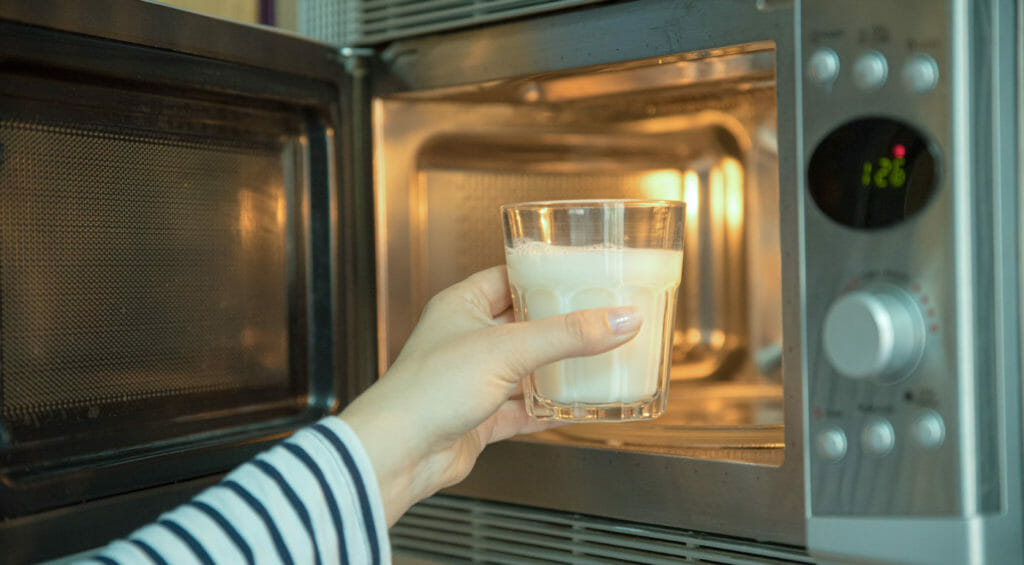
Food plays so many roles in our lives, from providing nutritional benefits to offering comfort. Many of us might have childhood memories of being given a glass of warm milk to help us fall asleep.
But if you’re now an adult trying to figure out how to sleep better, you might be curious: does warm milk help you sleep? Is this sleep tip based on science, or is it a myth?
Does Warm Milk Help You Sleep?
Let’s start with the science. Milk contains the amino acid tryptophan, which we need to digest our food and to produce serotonin. Serotonin converts to the sleep-inducing hormone melatonin, so you can see where the association between warm milk and sleep comes from.

Along with milk, good sources of tryptophan include leafy green vegetables, peanuts, turkey, chicken, fish, pumpkin seeds, sesame seeds, tofu, cheese, and soy. However, a cup of milk doesn’t contain nearly enough tryptophan on its own for the body to produce serotonin.
So does warm milk help you sleep? Well, not directly, but maybe indirectly.
Psychologists believe that the process of drinking milk may take you back to a childhood bedtime routine where drinking a cup of warm milk helped you sleep peacefully. Even though there is no direct link between drinking warm milk and enjoying a good night’s sleep, maybe this reminder of your childhood helps you relax and let go of anxious thoughts so you can fall asleep.
If your parents used to give you a cup of warm milk when you couldn’t sleep, you may be conditioned to feel sleepy when you drink warm milk. You might be familiar with this type of classical conditioning from hearing about the Russian physiologist Ivan Pavlov, who rang a bell every time he gave a dog a treat. Eventually, the dog would salivate when he heard the bell, regardless of whether he got a treat. So if your parents gave you warm milk to help you fall asleep as a child, drinking warm milk as an adult might make you feel sleepy, but that’s not because of the milk itself. Instead, it’s because you associate the two things. So for you, warm milk does help you sleep.
Another Way Warm Milk Helps You Sleep
For some people, the act of preparing a warm drink before bed could be part of their winding-down routine. For example, some people get ready for bed by drinking a cup of warm milk after taking a warm shower or while listening to relaxing music to help let go of the day. But a cup of herbal or decaffeinated tea could have the same effects.
That’s because the warmth of a bath or a hot drink can dilate the blood vessels, which helps cool your body down faster. A cooler body temperature promotes sleep, and in fact the best temperature for sleep is cooler than you might think.
What Foods Help You Sleep?

First of all, eating too much or too close to bedtime will not help you sleep. Going to bed with a full stomach interferes with your sleep, as the body is forced to redirect its focus and energy to digestion. You actually need to have already digested most of your food so your body can initiate the sleep cycle. In addition, sleeping with a full stomach can be physically uncomfortable and can lead to acid reflux. So no matter what you eat, it’s important to allow time for digestion before bed.
Despite several studies that disprove the myth that warm milk helps you sleep, some evidence suggests that calcium can help you sleep better. A recent article on calcium deficiencies states that calcium promotes the release of melatonin, a sleep-inducing hormone. A calcium deficiency could mean that you have trouble sleeping at night. While most people know that calcium can be found in milk, yogurt, and cheese, you can also find it in a variety of non-dairy foods, including almonds, lentils, sardines, rhubarb, edamame, figs, seeds, and dark, leafy greens. Eating these foods over a long period of time (weeks or months) will increase the amount of calcium in your body, helping release more melatonin and promoting healthy sleep. In particular, almonds, figs, and kale contain more calcium than milk, so theoretically, eating these foods could help you sleep better than a cup of warm milk.
Almonds are a particularly powerful light snack because they’re both a source of calcium and a source of magnesium, which reduces inflammation in the body and reduces the stress hormone cortisol. Excess cortisol disrupts the sleep cycle and makes you feel restless at night. In one recent study, when almond extract was given to rats, they slept for more hours than rats that didn’t get almond extract.
Studies in the Journal of Magnesium Research and International Journal of Clinical Chemistry have shown that deficiencies in selenium, vitamin C, vitamin D, vitamin B3, vitamin B6, vitamin B12, omega-3, potassium, and melatonin can lead to sleep disturbances. Foods that are high in selenium include tuna, beef, pork, chicken, turkey, cottage cheese, eggs, brown rice, mushrooms, oatmeal, and spinach. Foods high in vitamin C include broccoli, cantaloupe, cauliflower, kale, kiwi, orange juice, papaya, red/green/yellow peppers, sweet potatoes, strawberries, and tomatoes. Foods rich in vitamin D include mushrooms, eggs, yogurt, and most fish.
Foods rich in vitamin B3 include liver, pork, beef, anchovies, peanuts, avocado, and green peas. Foods rich in vitamin B6 include soybeans, peanuts, milk, potatoes, and poultry. Foods that contain omega-3 include walnuts, canola oil, sardines, chia seeds, mackerel, salmon, and flaxseeds. Foods that contain potassium include bananas, oranges, cantaloupe, honeydew, apricots, grapefruit, cooked spinach, cooked broccoli, sweet potatoes, peas, and cucumber.

If you’re not getting these vitamins and minerals from your diet, you could consider taking a supplement from the drugstore. If you have any questions regarding the proper vitamin intake for your weight, age, and sex, ask your doctor.
So, Can Warm Milk Help You Sleep?
No, warm milk does not specifically help you fall asleep. But the calcium in milk can help you sleep better over time, and drinking something warm before bed can help you cool off and sleep better. But you can probably enjoy similar benefits by making sure you’re getting enough vitamins and minerals, and by creating a wind-down bedtime routine.
And most importantly, make sure you have a quality mattress that gives your body the support it needs so you can wake up comfortable and well rested.